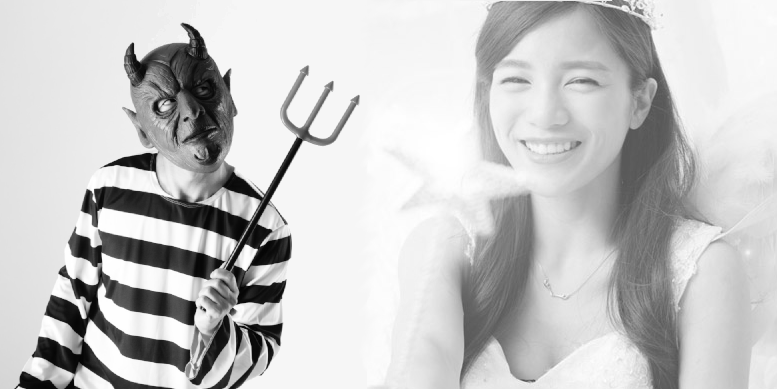Sometimes writers try to make their characters interesting by giving them a “gray” morality.
But what exactly is gray morality? And how can we use it to create good characters?
Let’s find out!
During the last stream, we went over “gray morality.” This topic was spurred by a question from RealSayakaMaizono, a viewer, who asked this:
“A lot of bad writers write characters that are literal saints or mustache twirling villains with maniacal laughter. It can be very hard to create a character that has gray morals, and can’t be conclusively called a hero/villain.”
There’s a lot to unpack here. How do you make an interesting hero/villain? How do you create a character with gray morals? And is it a good thing if someone is neither a hero nor villain?
You can see our full discussion here,
or scroll down for the highlights.
– What is “gray morality?” Is it when you can’t tell if someone is a hero or a villain?
– It’s more about someone being a three-dimensional individual.
– People are generally neither fully evil or good.
– Does being “gray” make your character interesting? Not necessarily.
– Many beloved heroes are fully “good” (Superman/Batman/Cpt. America).
– Many beloved villains are fully “evil” (Cruella DeVille/Scar/Jafar).
– Many “gray” characters are boring (Bad guy in Big Hero 6/tons of supervillains)
– BEING INTERESTING is what makes a character interesting.
– To make a character interesting, give them motivations that make sense, conflict that gets in their way, flaws that result in mistakes with consequences, and something unique that makes them stand out.
– Every character should be the “hero” in their own story.
– An interesting character will always have some “gray” to them, but a gray character will not be inherently interesting, so it’s good to start from “interesting” and have the “grayness” evolve from there.
Chat voted that we come up with an interesting hero and villain for this story: A world where water is rare.
Here’s what we came up with:
HERO
- Motivation – Finding sustainable water for their town that has run out and can’t afford to buy it anymore. They are a Robin Hood of water.
- Conflict – The corporation controlling the water has gotten better at protecting/transporting it, and now the hero has to up their game and infiltrate the headquarters.
- Flaw(s) – Short-sighted, can’t see the bigger picture/problems (if they bring water to one person, they deny it to another)
- Unique – Harpoon-gun with water-container backpack!
VILLAIN
- Motivation – Providing potable water to as many people as possible.
- Conflict – Doing that requires money, people, effort, all of which requires water to function, and the Robin Hood band is destroying their best efforts to do so.
- Flaw(s) – They just want the Robin Hood town to go away so that way they can keep providing to the other non-belligerent villages, so they attack and destroy it.
- Unique – Gaunt appearance, because he only drinks the absolute minimum to survive, to give as much water as possible to people.
You can see how by focusing on the four factors to make the character interesting, rather than focusing on making them “gray,” we ended up with some good characters. The Hero has some “bad” in him (denying water to other people who paid for it), and the Villain has some good in him (trying to do the best for the largest number of people).
By trying to come up with interesting characters, we ended up with some cool “gray” ones. However, if we’d tried going the opposite direction (starting with “gray” characters and trying to make them interesting), it would have been much more difficult. I always recommend going about it this way in your own writing!
After that, chat voted that we write a story that started with this (surprisingly beautiful?) randomly-generated sentence from a Twitter bot: Above the bramble, when the fractures rust, I follow the frost’s bare darkness.
Here’s what we came up with:
Above the bramble, when the fractures rust, I follow the frost’s bare darkness. Unsheathed flesh crimples against the bridge as vertigo reflects the jungle beneath me. Mangled monsters christened with unblinking eyes, copper serpents bleeding shadows, sleep wrapped in the vines. Whispers of Grandfather’s mumbled names—Revroom, Hide-hauler, Whels—reverberate as echoes of forgotten gods.
A mistake. A misstep. A fall. My fingernails drill into the glassy surface. Snaps of frozen thunder crack across the bridge. Rolling wideways back on top, I rabbit-claw across the chilled night sky as it cries out to drag me down to vicarious death. As the final crack rings out behind me, my feet crunch down on dying grass, and I turn to see it crumble, its soul evaporating in a cloud of pungent white.
I can never return to Grandpa’s home. From below, the dead gods cheer me on in silence.
If you want to join us and help write a story by trolling in chat, or share your own writing for feedback, then we’d love to have you. We stream on Twitch every Sunday, Tuesday, and Thursday at 6:30pm-10:30pm (U.S. Eastern Standard Time).
And you missed the stream, you can still watch them on the YouTube channel or watch the full stream reruns.
Hope to see you next time, friend!
Scott Wilson is the author of the novel Metl: The ANGEL Weapon,
forthcoming March 2019.
